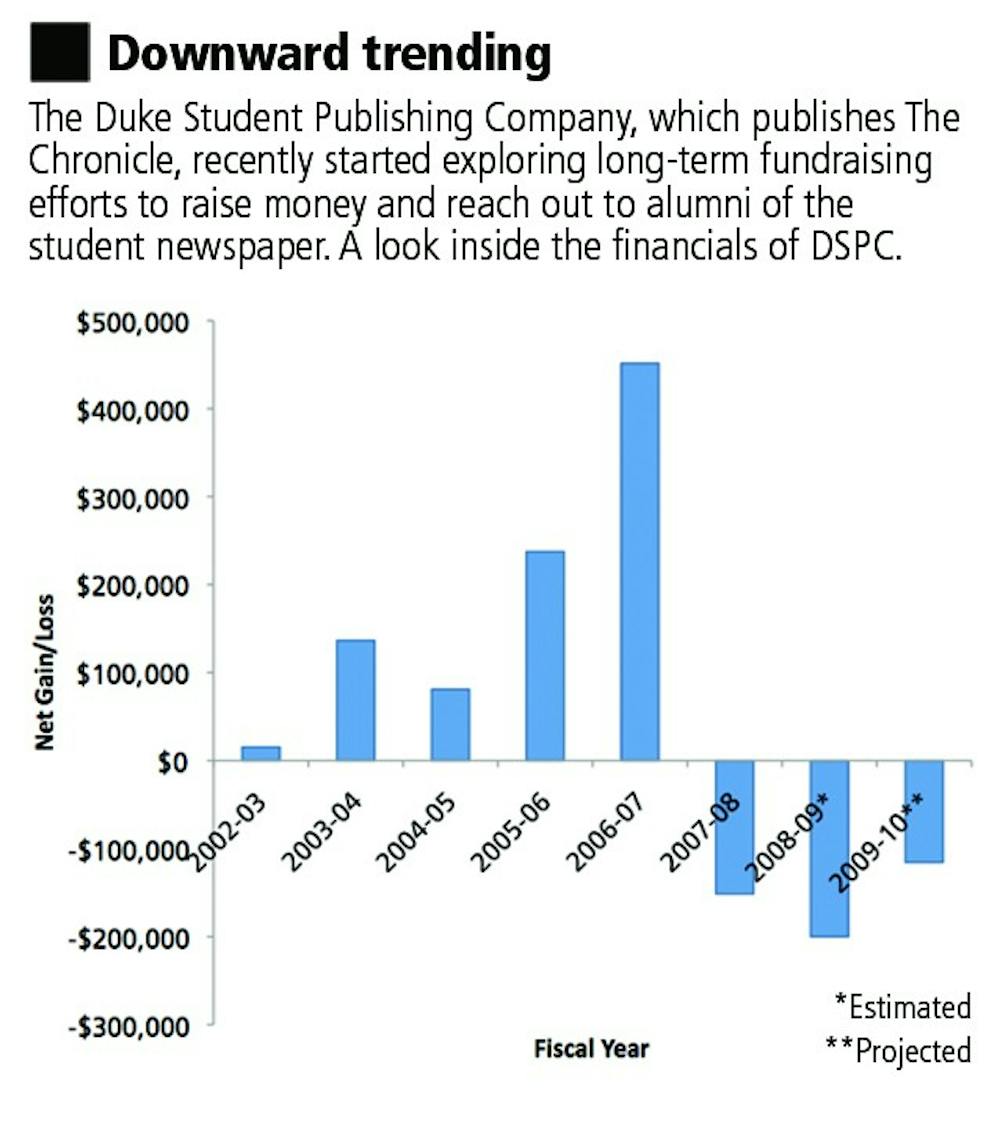Duke’s independent daily newspaper may soon accept more than just letters to the editor.
The Board of Directors of the Duke Student Publishing Company, which publishes The Chronicle, voted at its meeting Jan. 30 to pursue a long-term fundraising effort.
“Last year was a tough year for us after the market went down—you know, advertising did drop and we had to do some things in response, we had to cut expenses,” said DSPC Board co-Chair Karen Blumenthal, Trinity ’81. “We feel it’s our job to develop new sources of revenue so we don’t get lost and left behind.”
The Chronicle’s revenue declined from $1.4 million to $1.2 million from the 2008 fiscal year to the 2009 fiscal year, due mainly to falling advertising income. Two Chronicle staff members were laid off during the summer of 2009 and two accepted University early retirement packages funded by The Chronicle, Blumenthal said. She said no more layoffs are currently planned.
The decision to begin fundraising efforts was made on the recommendation through a report presented to the Board by Capital Development Strategies, a consulting firm for nonprofits.
The report—which was funded by a grant from the Jean T. and Heyward G. Pelham Foundation—was requested by the Board in late spring to explore the viability of alumni fundraising.
“Our research shows that Chronicle alumni do have an interest to support the newspaper and that The Chronicle is making a wise decision to consider diversifying its funding sources,” said Pam Larmee, a senior associate at Capital Development Strategies.
The research for the report involved surveying a wide range of student newspapers with different levels of fundraising revenue, Larmee said. She added that newspapers were most successful in using fundraising as an additional revenue source when they dedicate staff to raising money.
DSPC General Manager Jonathan Angier said that this is the first time The Chronicle has solicited donations, and a committee has been formed to review the report and determine the logistics and timing of any future fundraising endeavors. Blumenthal, a member of the committee, said she expects the first steps to be taken in the next school year, although she does not know yet what those steps will be.
According to the Capital Development Strategies report, The Chronicle should attempt to bring in approximately $75,000 in donations in 2010.
Chronicle Advertising/Marketing Director Chrissy Beck said fundraising revenues will not be a significant part of the budget for several years.
“As best as we can tell now, advertising will always be the core of The Chronicle’s support,” said DSPC co-Chair David Ingram, Trinity ’03. “We don’t see that changing, we don’t see The Chronicle becoming alumni-supported.”
The Chronicle has a reserve fund worth more than $1 million, Blumenthal said. She added that although the company has had to dip into that fund in the past year, the fund remains in a healthy state.
“We have pretty deep reserves here, it’s not like we’re scraping day to day to pay for something,” Angier said. “But we took a real hit just like every other fund, and we’re trying to make that up just like everyone else is.”
Because the reserve fund is managed with Duke’s endowments, it, too, has suffered significant losses over the past two years.
Although the newspaper has had to cut costs wherever possible for the past year, Blumenthal said the primary goal has been to preserve the product itself, as well as the student experience.
Angier said additional revenue from fundraising will help to support The Chronicle’s news-gathering and educational missions.
“For a 501(c)(3) [non-profit corporation], who not only wants to do the best they can to put news out, but to also give students the best education they can... it only makes sense that we not try to rely strictly on the proceeds of a newspaper,” he said. “We’re very fortunate to be a 501(c)(3) because it makes it legitimate for us to look to broaden our revenue stream, because education is our business.”
While a fundraising campaign would help financially, Blumenthal said the additional benefit of reconnecting with the newspaper’s alumni is equally important.
Ingram said he would like to see Chronicle alumni return to campus to interact not only with current students but with the rest of the Duke community as well.
Get The Chronicle straight to your inbox
Sign up for our weekly newsletter. Cancel at any time.
The need for additional revenue streams is also due in part to the changing nature of journalism, several Board members said.
“As digital information and media have continued to increase, a lot of what’s going on now is we’re recognizing a time when just publishing a newspaper isn’t really going to do the job,” Angier said.

